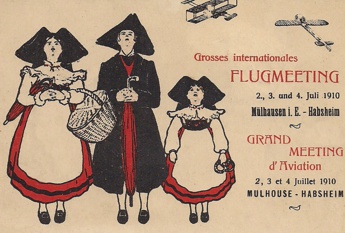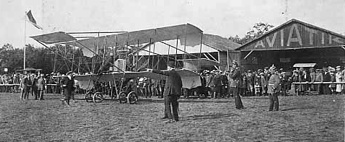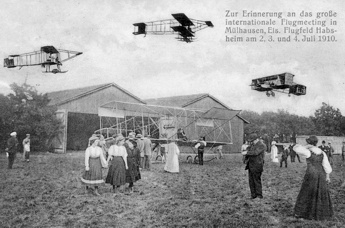Mülhausen im Elsass, Germany, July 2nd - 4th, 1910
The first meeting at one of the world's oldest active airfields







It has been very difficult to find photos from this meeting. If you know of any good photos please let us know!

Mülhausen im Elsass (nowadays better known in French
as Mulhouse) is a town in Alsace, which between the
Franco-Prussian War of 1870-1871 and the Treaty of
Versailles of 1919 belonged to the German Empire. It was
the industrial centre of Alsace, with important textile
factories, and before the German period it was sometimes
referred to as "the Manchester of France". Its
population had grown quickly during the industrialization
of the 19th century, and in 1910 the town had around
95,000 inhabitants.
In December of 1909 Julius Spengler and Georges Chatel
founded the Aviatik G.m.b.H. in Mülhausen. The company
agreed a license to build Farman biplanes, which were
equipped with German Adler engines. They produced the
machines in Bourtzwiller in the north part of the town,
and they built a couple of hangars and established an
airfield at the military exercise grounds that were
located on the border between the neighbouring communes
of Habsheim and Rixheim, some 10 kilometres east of the
centre of the town.
In the spring of 1910 Aviatik decided to organize an
aviation meeting, in cooperation with the Strasbourg
section of the Oberrheinischen Verein für
Luftschifffahrt. The meeting was scheduled for three days
in the beginning of July, a prize fund of 30,000 Mark was
raised and entries for seven pilots were received. Five
of them had participated in other German meetings earlier
in the year: Emil Jeannin (Aviatik), Robert Thelen
(Wright), Ellery von Gorrissen (Euler), Adolf Behrend
(Schultze-Herfort) and Stefano Amerigo (Sommer). René
Barrier on a Blériot had participated in the meetings of
Sevilla, Barcelona and Mondorf, while the last entrant
was an unknown pilot by the name of "Haeffely"
on a Voisin (possibly August Haefeli of Switzerland?),
who had injured an arm the day before the meeting and
couldn't participate. Jeannin was Aviatik's
factory pilot and the local favourite, according to the
reporter from "Express" always surrounded by a
swarm of pretty women. Von Gorrissen had ridden around
the Habsheim field on horseback less than a year before
as a Leutnant of the "Jäger-zu-Pferde-Regiment Nr.
5", before his military career ended.
Saturday 2 July
The weather on the first day of the meeting was sunny and
bright, but a strong wind was blowing from the west. The
at least 10,000 visitors had to wait a long time before
any of the flyers ventured out of their hangars, but they
were patient and there were bars on every two hundred
metres around the field, as well as a "first
class" restaurant by the grandstand, operated by the
Wiesberger Zentralhotel. A military orchestra was also
doing its best to entertain the visitors, although
according to the reporter from the "Straßburger Neue
Zeitung" it played too loud.
The wind decreased during the late afternoon, and the
flying could start. Jeannin could claim the first daily
"Frühpreis", for the first flight of two laps
on each day. He made three flights of in total 40 minutes
during the afternoon, the longest lasting for almost 26
minutes. He also reached a height of 160 metres, which
would eventually win him the altitude prize. The only
other pilot to make any significant flight was von
Gorrissen, who made a flight of ten minutes. Thelen had
engine troubles that kept him grounded, except for a
short test that ended in the middle of the field when the
engine stopped. Behrend also made a short test, but
immediately noticed some problems with his controls,
which needed repairs. The machines of Amerigo and Barrier
hadn't arrived in time to be readied for flight
during the first day.
Sunday 3 July
The weather wasn't ideal on the second day either,
with rain clouds threatening over the hills and a wind of
7 m/s on the ground. Between 20,000 and 30,000 visitors,
including 5,000 children from the schools of the
neighbourhood, had gathered at the airfield, where the
orchestra of the fire brigade and the "Orpheon
Musical" delivered the day's musical
entertainment.
The flying was planned to start at five o'clock, and
this fortunately coincided with calmer weather. Jeannin,
who had described his machine for some of the
schoolchildren, took off, but only for a short test. Then
Thelen made a flight of some ten minutes, claiming the
day's "Frühpreis". When he had landed the
wind increased again, so there was another quiet
interval. At a quarter past six Thelen again took off,
this time for a flight of nine minutes, and after another
fifteen minutes he made a third flight. Then the other
flyers, one after one, got into the action, first
Barrier, then Behrend, then von Gorrissen and finally
Jeannin. Neither of them made any particularly long
flights, but at one time there were five planes in the
air at the same time, and the last flight only ended
shortly before nine o'clock. Behrend had to abandon
an effort for the speed prize when the field was invaded
by spectators who were going to catch a train.
When the results were announced, Jeannin had made the
day's longest flight, of 18:30, while Thelen,
accompanied by a Leutnant Oppen of the 5. Jägerregiment,
won the passenger prize. In the totalisation prize,
Jeannin (1 h 27:05) lead over Thelen (58:26), with von
Gorrissen third.
The day's excitement had apparently been too much for
Herr Golder, Gemeinderat (municipal councillor) of
Mülhausen, who suffered a stroke at the airfield and
passed away at eight o'clock in the evening.
After the end of the day's flights, the crowds made
their way out of the airfield into Mülhausen and the
villages of Rixheim and Habsheim, where, according to the
reporter from "Straßburger Neue Zeitung",
celebrations went on until late after midnight, leading
him to expect that many aviation enthusiasts would skip
work on the Monday to watch the last day of the
meeting…
Monday 4 July
Those who had skipped work were in for a disappointment,
because it rained heavily all through the morning, and
when the rain stopped, the wind increased. Further gloom
was added when the airfield was reached by the news that
Antoinette pilot Charles Wachter had crashed to his death
the day before, on the opening day of the Reims meeting,
becoming the world's eighth pilot to die in an
accident. The local police had forbidden all flying in
winds above 4 m/s, a regulation that was now suddenly
enforced, but according to the reporter from
"Express" in a rather elastic manner.
The impatient crowds had to wait until seven o'clock
before the first machine was rolled out, Thelen's
Wright. He gave up already after a lap and a half, not
enough to qualify for the "Frühpreis". His
flight was followed by another rain shower and increased
winds.
Towards eight o'clock the weather improved somewhat,
and Thelen brought his machine out again. This time he
managed three laps, winning a rather late
"Frühpreis". He was followed by Jeannin, who
made a cautious flight of a lap and a half. Thelen took
off again, followed by Behrend and by Barrier, who landed
almost immediately. Von Gorrissen and Amerigo made short
flights. The rain returned and everybody landed except
Thelen and Behrend. Thelen again suffered from engine
problems and was forced down, but soon took off again and
made a flight of some five laps, winning the prize for
the day's longest flight. Jeannin apparently felt his
lead in the total endurance contest was safe, so he
stayed on the ground.
Behrend won the speed prize with a time of around 10
minutes over the four 2,5-kilometre laps. The weather
didn't allow any efforts for the altitude prize, so
Jeannin's result of the day before remained unbeaten.
Despite trying hard and getting almost within three
minutes, Thelen couldn't threaten Jeannin's win
in the total endurance prize with a total time of 1 h
32:09. Soon after eight, the weather turned worse again
and put an end to the meeting.
Conclusion
The weather was not kind to Georges Châtel and his fellow
organizers, and on the Saturday and Monday many
spectators left disappointed. Despite this, the
arrangement were considered a success. There had been no
accidents and the meeting left a tidy profit - it had
cost 30,000 Mark to arrange and the income was around
50,000. Aviatik sold a couple of machines during the
meeting, each for 25,000 Mark, and thanks to the success
of the meeting they could make an agreement with the
military that they could use the grounds for a flying
school.
 Back to the top of the page
Back to the top of the page
